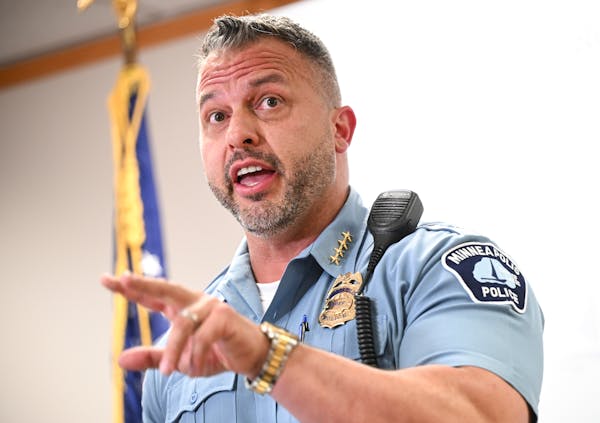A Hennepin County judge this week ruled that a defamation case brought by fired Minneapolis police officer Tyler Timberlake against the city and Chief Brian O'Hara has merit to proceed, denying claims that the top law enforcement officer's public comments were shielded under "absolute privilege."
Timberlake sued for defamation and wrongful termination in December, six months after being ousted from his new job with the Minneapolis police following public controversy about a previous use-of-force case in Virginia.
In her 41-page order, District Judge Karen Janisch wrote that prior case law doesn't convince her that such immunity should be granted to "a non-elected police chief" — and that doing so would extend the practice beyond what is currently recognized by the Minnesota Supreme Court.
Her ruling denied the motion to dismiss three of the four defamation claims Timberlake alleged in his lawsuit related to statements made in the aftermath of his firing, but said they must be further proven.
"We are very happy with the judge's order and extremely confident in our case," said Timberlake's attorney, Joe Tamburino, in a statement to the Star Tribune. "We look forward to proceeding with discovery, including deposing the chief, and an eventual trial."
Days after George Floyd's murder in 2020, Timberlake was accused of using a stun gun on an unarmed Black man in Fairfax County, Va., with no apparent provocation. The encounter was captured on body camera video, made national headlines and decried by then-Fairfax County Police Chief Edwin C. Roessler Jr. as "horrible."
Timberlake was charged with three misdemeanor counts of assault and battery. A Virginia jury ultimately found him not guilty.
The revelations sparked criticism of O'Hara, who had signed off on Timberlake's hiring even though he knew about the case and was present during his final job interview.
Amid heightened scrutiny, O'Hara made a series of false public statements in a "panicked effort to evade responsibility," according to the lawsuit. Two city news releases said O'Hara was ordering a full review of MPD's hiring processes — implying that the chief didn't know about the incident in Virginia, according to the suit, and that Timberlake's application slipped through the cracks.
Timberlake's attorneys say that Minneapolis violated the state whistleblower act by firing him after he alerted several officials, including Mayor Jacob Frey and the head of Human Resources, that O'Hara's comments were defamatory. The termination left his reputation "in tatters" and has made it impossible to find work, according to the lawsuit.
During a motion to dismiss hearing in April, attorneys for O'Hara and the city each argued that, as a top-level executive in Minneapolis, the chief was protected from litigation of this nature under "absolute privilege."
In essence, they claimed it didn't matter whether all of O'Hara's public statements about the case were true because the very nature of his role shielded him from liability while responding to the press.
"The chief was undoubtedly addressing matters of public concern," said Assistant City Attorney Munazza Humayun, who cast many of O'Hara 's comments as subjective "mental impressions."
In Monday's ruling, Janisch denied a monthslong request to dismiss the lawsuit outright, allowing the bulk of Timberlake's allegations to proceed in court.
She did, however, throw out Timberlake's wrongful termination claim and one specific defamation claim involving a vague media statement made to Fox 9 on May 5, 2023. The latter, the judge ruled, wasn't actionable as defamation because it contained no direct reference to Timberlake, instead referring to O'Hara's expectations about the hiring process.
O'Hara's attorney, Doug Kelley, told the Star Tribune their team respectfully disagreed with Janisch's conclusion that absolute privilege is not warranted in this case.
"I think that is a question for the Minnesota Supreme Court to decide," Kelley said, adding that he remains optimistic that the judge may entertain another motion on this issue to determine whether the case could proceed to a trial.
"The judge's decision recognized that the chief's statements mainly dealt with his concern about MPD's hiring policies and were not about Timberlake," he said. "That's a positive development for the ultimate outcome of the case."
Star Tribune staff writers Rochelle Olson and Eder Campuzano contributed to this report.

Want to share info with the Star Tribune? How to do it securely

'Safe recovery sites' would offer syringes, naloxone and more to people using drugs. The plan could be in peril.
New Minnesota GOP leaders seek peace with party's anti-establishment wing

Who is Republican Lisa Demuth, Minnesota's first House speaker of color?

